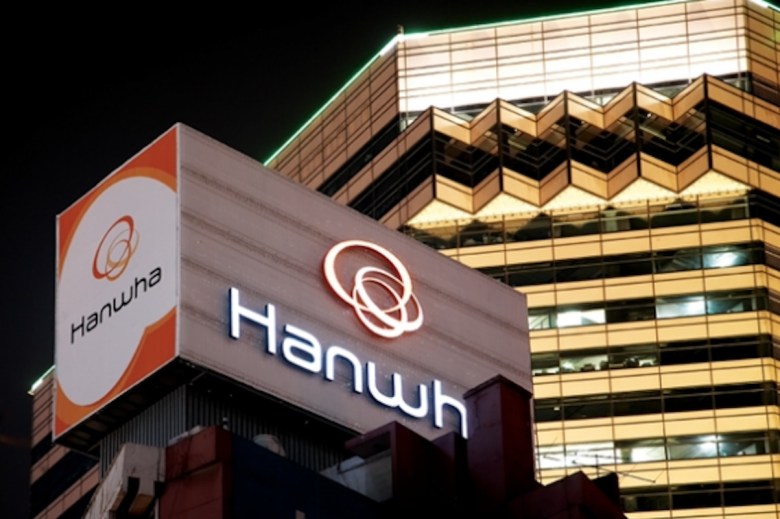Politics
Hanwha Group’s Lobbying Efforts Backfire in US-China Dynamics

The South Korean conglomerate, Hanwha Group, has faced significant backlash following its lobbying efforts in the United States aimed at imposing tariffs on Chinese solar modules. The campaign, which framed the tariffs as crucial for “US energy security,” has not only backfired but also jeopardized relationships with American developers and risked destabilizing regional supply chains.
Hanwha Group, one of Asia’s largest industrial conglomerates, sought to leverage the ongoing tensions between the US and China to gain market share. However, the move has instead led to a deterioration of its standing as a reliable partner. The lobbying efforts were particularly focused on solar panels exported through Southeast Asian countries, including Malaysia and Vietnam, which the US relies on to diversify its supply chains away from China.
Qcells, Hanwha’s US solar subsidiary, once epitomized the success of foreign investment in America. It built factories in Georgia, created local jobs, and qualified for generous incentives under the Inflation Reduction Act. This positioning symbolized how foreign firms could support US supply chain resilience. But as Chinese companies began exporting low-cost solar panels through Southeast Asia, Hanwha opted for a political strategy rather than innovating.
The company’s call for new tariffs was not merely a defense of American jobs, but rather an instance of “rent-seeking” disguised as patriotism. This approach overlooked a critical aspect of US trade policy: the importance of Southeast Asia as a strategic partner. Imposing tariffs could fracture the very networks that facilitate US diversification from China and maintain alignment with the Association of Southeast Asian Nations (ASEAN).
The response from the US solar market was swift and severe. Developers warned of potential project cancellations and increased costs, while utilities expressed hesitation in their contracts. Questions arose within Washington regarding whether South Korea was prioritizing protectionist policies over cooperative partnership.
Hanwha’s misstep is indicative of a broader issue among middle powers that misinterpret US intentions. The US is not pursuing a full decoupling from China but is instead seeking a managed interdependence that allows for flexibility in lower-stakes sectors. When allies, like South Korea, advocate for stringent measures against China, they risk crossing a delicate line from being a valuable partner to becoming a political nuisance.
The economic stakes for South Korea are particularly high. The nation has thrived through access to US technology while maintaining substantial trade relations with China. An over-identification with one side can invite retaliation from the other. When corporations act without a unified strategic approach, they can undermine the trust that is essential for sustaining international partnerships.
Hanwha’s recent actions are not isolated examples. Other middle powers are also navigating similar challenges. For instance, Turkey’s arms dealings with Russia have raised suspicions within NATO, while Saudi Arabia has skillfully played Washington and Beijing against each other to secure concessions. India, on the other hand, has managed a delicate balancing act by engaging with both the Quad and China.
Success in this geopolitical landscape requires restraint. Middle powers can gain influence not by aggressively challenging larger nations, but by adapting to the prevailing dynamics. Hanwha’s ambition to exploit US-China tensions ultimately led to a lack of awareness regarding the broader implications of their actions.
South Korea now faces a critical juncture. While its prosperity relies on globalization, domestic politics increasingly reward nationalist sentiments. When private firms act unilaterally in the geopolitical arena, they risk creating contradictions within national policy. Washington must also reevaluate its industrial strategies, which encourage allied participation but may inadvertently promote protectionism.
The episode involving Hanwha underscores a vital lesson: corporate profit motives can diverge from national interests, potentially turning allies into unintentional saboteurs. As the world becomes more fragmented into rival blocs, the temptation to exploit great-power rivalries will intensify.
To remain relevant in this evolving order, nations must prioritize reliability over opportunism. Those that overreach may find themselves isolated, while those that adopt a long-term perspective will cultivate trust, investment, and influence. The missteps of Hanwha serve as a reminder that in an era of uncertainty, restraint can often be the most powerful strategy. Understanding when to assert influence and when to collaborate is crucial for navigating the complex landscape of international relations.
-

 Lifestyle3 months ago
Lifestyle3 months agoHumanism Camp Engages 250 Youths in Summer Fest 2025
-

 Sports3 months ago
Sports3 months agoDe Minaur Triumphs at Washington Open After Thrilling Comeback
-

 Business4 months ago
Business4 months agoKenvue Dismisses CEO Thibaut Mongon as Strategic Review Advances
-

 Sports4 months ago
Sports4 months agoTupou and Daugunu Join First Nations Squad for Lions Clash
-

 Top Stories4 months ago
Top Stories4 months agoColombian Senator Miguel Uribe Shows Signs of Recovery After Attack
-

 World4 months ago
World4 months agoASEAN Gears Up for Historic Joint Meeting of Foreign and Economic Ministers
-

 Business4 months ago
Business4 months agoOil Prices Surge Following New EU Sanctions on Russia
-

 Entertainment3 months ago
Entertainment3 months agoDetaşe-Sabah Violin Ensemble Captivates at Gabala Music Festival
-

 Health3 months ago
Health3 months agoNew Study Challenges Assumptions About Aging and Inflammation
-

 Entertainment3 months ago
Entertainment3 months agoBaku Metro Extends Hours for Justin Timberlake Concert
-

 Business4 months ago
Business4 months agoU.S. House Approves Stablecoin Bill, Sends to Trump for Signature
-

 Top Stories4 months ago
Top Stories4 months agoRethinking Singapore’s F&B Regulations Amid Business Closures









